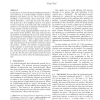Free Online Productivity Tools
i2Speak
i2Symbol
i2OCR
iTex2Img
iWeb2Print
iWeb2Shot
i2Type
iPdf2Split
iPdf2Merge
i2Bopomofo
i2Arabic
i2Style
i2Image
i2PDF
iLatex2Rtf
Sci2ools
123
click to vote
SODA
2008
ACM
2008
ACM
On the approximability of influence in social networks
In this paper, we study the spread of influence through a social network, in a model initially studied by Kempe, Kleinberg and Tardos [14, 15]: We are given a graph modeling a social network, where each node v has a (fixed) threshold tv, such that the node will adopt a new product if tv of its neighbors adopt it. Our goal is to find a small set S of nodes such that targeting the product to S would lead to adoption of the product by a large number of nodes in the graph. We show strong inapproximability results for several variants of this problem. Our main result says that the problem of minimizing the size of S, while ensuring that targeting S would influence the whole network into adopting the product, is hard to approximate within a polylogarithmic factor. This implies similar results if only a fixed fraction of the network is ensured to adopt the product. Further, the hardness of approximation result continues to hold when all nodes have majority thresholds, or have constant degree...
Algorithms | Node | Social Network | SODA 2008 | Threshold Tv |
Related Content
| Added | 30 Oct 2010 |
| Updated | 30 Oct 2010 |
| Type | Conference |
| Year | 2008 |
| Where | SODA |
| Authors | Ning Chen |
Comments (0)

